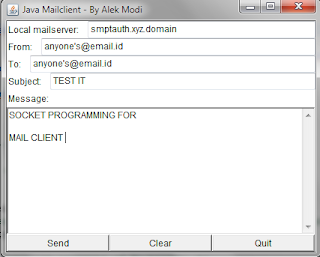//Message.java
//Generating Header and message body
import java.util.*;
import java.text.*;
public class Message {
/* The headers and the body of the message. */
public String Headers;
public String Body;
/* Sender and recipient. With these, we don't need to extract them
from the headers. */
private String From;
private String To;
/* To make it look nicer */
private static final String CRLF = "\r\n";
/* Create the message object by inserting the required headers from
RFC 822 (From, To, Date). */
public Message(String from, String to, String subject, String text) {
/* Remove whitespace */
From = from.trim();
To = to.trim();
Headers = "From: " + From + CRLF;
Headers += "To: " + To + CRLF;
Headers += "Subject: " + subject.trim() + CRLF;
/* A close approximation of the required format. Unfortunately
only GMT. */
SimpleDateFormat format =
new SimpleDateFormat("EEE, dd MMM yyyy HH:mm:ss 'GMT'");
String dateString = format.format(new Date());
Headers += "Date: " + dateString + CRLF;
Body = text;
}
/* Two functions to access the sender and recipient. */
public String getFrom() {
return From;
}
public String getTo() {
return To;
}
/* Check whether the message is valid. In other words, check that
both sender and recipient contain only one @-sign. */
public boolean isValid() {
int fromat = From.indexOf('@');
int toat = To.indexOf('@');
if(fromat < 1 || (From.length() - fromat) <= 1) {
System.out.println("Sender address is invalid");
return false;
}
if(toat < 1 || (To.length() - toat) <= 1) {
System.out.println("Recipient address is invalid");
return false;
}
if(fromat != From.lastIndexOf('@')) {
System.out.println("Sender address is invalid");
return false;
}
if(toat != To.lastIndexOf('@')) {
System.out.println("Recipient address is invalid");
return false;
}
return true;
}
/* For printing the message. */
public String toString() {
String res;
res = Headers + CRLF;
res += Body;
return res;
}
}


No comments:
Post a Comment